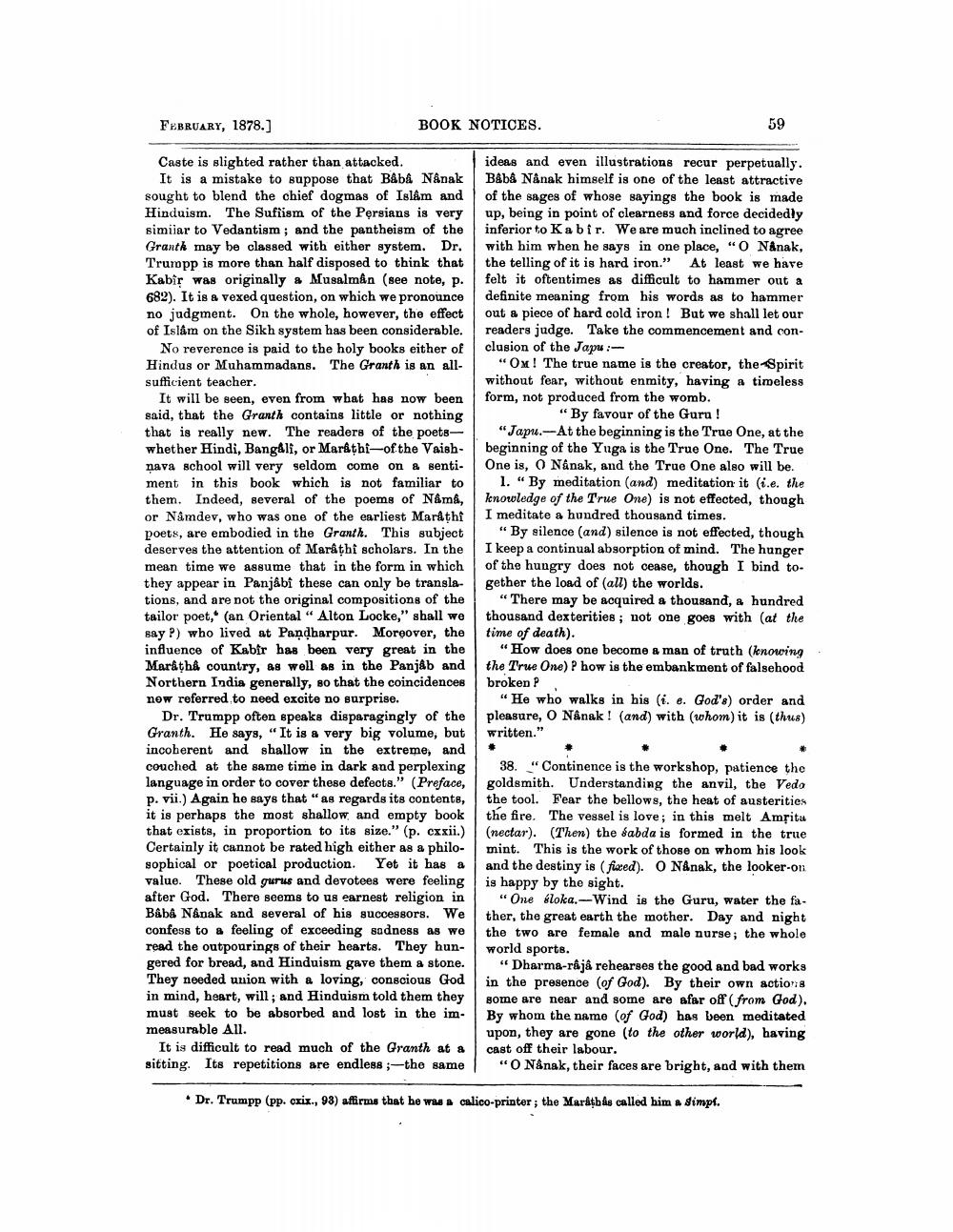________________
FEBRUARY, 1878.]
Caste is slighted rather than attacked. It is a mistake to suppose that Bâbâ Nanak sought to blend the chief dogmas of Islam and Hinduism. The Sufiism of the Persians is very similar to Vedantism; and the pantheism of the Granth may be classed with either system. Dr. Trumpp is more than half disposed to think that Kabir was originally a Musalman (see note, p. 682). It is a vexed question, on which we pronounce no judgment. On the whole, however, the effect of Islam on the Sikh system has been considerable. No reverence is paid to the holy books either of Hindus or Muhammadans. The Granth is an allsufficient teacher.
BOOK NOTICES.
It will be seen, even from what has now been said, that the Granth contains little or nothing that is really new. The readers of the poetswhether Hindi, Bangali, or Marathi-of the Vaishnava school will very seldom come on a sentiment in this book which is not familiar to them. Indeed, several of the poems of Nâmâ, or Nâmdev, who was one of the earliest Marathi poets, are embodied in the Granth. This subject deserves the attention of Marâțhî scholars. In the mean time we assume that in the form in which they appear in Panjâbî these can only be transla tions, and are not the original compositions of the tailor poet, (an Oriental " Alton Locke," shall we say?) who lived at Pandharpur. Moreover, the influence of Kabir has been very great in the Maratha country, as well as in the Panjab and Northern India generally, so that the coincidences now referred to need excite no surprise.
Dr. Trumpp often speaks disparagingly of the Granth. He says, "It is a very big volume, but incoherent and shallow in the extreme, and couched at the same time in dark and perplexing language in order to cover these defects." (Preface, p. vii.) Again he says that "as regards its contents, it is perhaps the most shallow and empty book that exists, in proportion to its size." (p. cxxii.) Certainly it cannot be rated high either as a philosophical or poetical production. Yet it has a value. These old gurus and devotees were feeling after God. There seems to us earnest religion in Bâbâ Nanak and several of his successors. We confess to a feeling of exceeding sadness as we read the outpourings of their hearts. They hungered for bread, and Hinduism gave them a stone. They needed union with a loving, conscious God in mind, heart, will; and Hinduism told them they must seek to be absorbed and lost in the immeasurable All.
59
ideas and even illustrations recur perpetually. Baba Nanak himself is one of the least attractive of the sages of whose sayings the book is made up, being in point of clearness and force decidedly inferior to Ka bir. We are much inclined to agree with him when he says in one place, "O Nanak, the telling of it is hard iron." At least we have felt it oftentimes as difficult to hammer out a definite meaning from his words as to hammer out a piece of hard cold iron! But we shall let our readers judge. Take the commencement and conclusion of the Japu :
"OM! The true name is the creator, the Spirit without fear, without enmity, having a timeless form, not produced from the womb. "By favour of the Guru!
"Japu.-At the beginning is the True One, at the beginning of the Yuga is the True One. The True One is, O Nának, and the True One also will be.
1. "By meditation (and) meditation it (i.e. the knowledge of the True One) is not effected, though I meditate a hundred thousand times.
"By silence (and) silence is not effected, though I keep a continual absorption of mind. The hunger of the hungry does not cease, though I bind together the load of (all) the worlds.
"There may be acquired a thousand, a hundred thousand dexterities; not one goes with (at the time of death).
"How does one become a man of truth (knowing the True One)? how is the embankment of falsehood broken ?
"He who walks in his (i. e. God's) order and pleasure, O Nának! (and) with (whom) it is (thus) written."
38. "Continence is the workshop, patience the goldsmith. Understanding the anvil, the Vedo the tool. Fear the bellows, the heat of austerities the fire. The vessel is love; in this melt Amrita (nectar). (Then) the sabda is formed in the true mint. This is the work of those on whom his look and the destiny is (fixed). O Nanak, the looker-on is happy by the sight.
"One loka.-Wind is the Guru, water the father, the great earth the mother. Day and night the two are female and male nurse; the whole world sports.
"Dharma-rajâ rehearses the good and bad works in the presence (of God). By their own actions some are near and some are afar off (from God). By whom the name (of God) has been meditated upon, they are gone (to the other world), having cast off their labour.
"O Nanak, their faces are bright, and with them
It is difficult to read much of the Granth at a sitting. Its repetitions are endless;-the same
Dr. Trumpp (pp. cxix., 93) affirms that he was a calico-printer; the Marâthâs called him a simpl.




